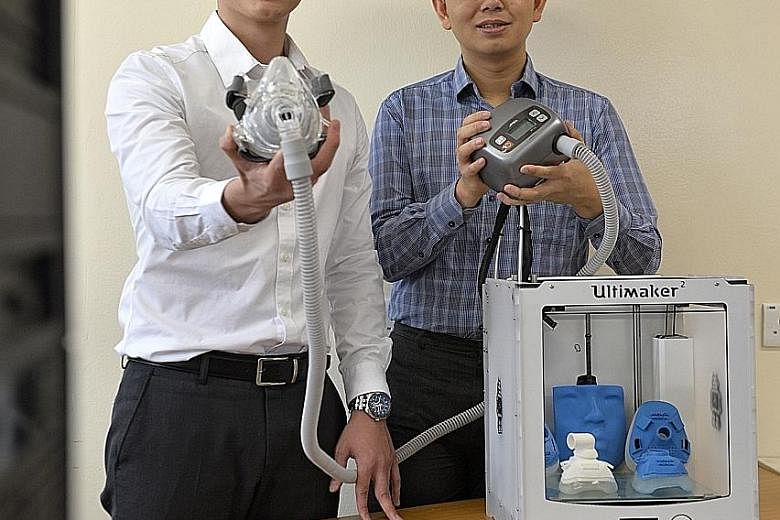Q What is sleep apnoea and how do CPAP masks help?
Mr Wanto Sleep apnoea is a disorder which prevents people from breathing properly in their sleep.
Sufferers often wake up multiple times a night because their airway is blocked. They also snore loudly and are unable to sleep well. This means they can't concentrate and perform well the next day.
It also raises the risk of diabetes and high blood pressure.
Continuous positive airway pressure (CPAP) is the leading therapy for sleep apnoea.
Patients wear a face or nasal mask connected to a machine, which helps them to breathe during sleep and makes sure they have enough oxygen.
Q Why did you decide to target the sleep apnoea market?
Mr Wanto Medical wearables like CPAP masks have traditionally not been customised - they are mass-produced and come in standard sizes like S, M, L.
But people wear the masks every single night for about eight hours.

If it's not worn tight, air will leak out from the sides. But when worn too tight there can be pain and pressure points when the mask doesn't conform exactly to the person's face.
We decided to look into this because so many CPAP users complain about having to wear the mask - research shows that half the people who wear CPAP masks quit because of the discomfort.
Mr Suriady The general consensus is that the first CPAP mask you buy will not fit you. Patients end up buying multiple masks until they find one that fits. Mass-produced CPAP masks on the market now are mostly designed for Caucasian facial contours, which might not suit many Asians.
Q How does your product help?
Mr Wanto We've designed an algorithm that can scan people's faces.
Based on this scan we create a mask that perfectly suits each person's face, so patients will not need to buy four or five different masks any more. We guarantee this one will fit.
We'll ship a 3D scanner to doctors who partner with us - it's simple to use and anyone can learn how to within two minutes.
Doctors can then scan their patients' faces, and the data will automatically be uploaded to our database.
Our server will run the algorithm, we'll do some manual adjustments to make sure it's perfect, then we'll ship the mask to the customer.
Customers can also opt for a subscription model and receive a new mask every six to 12 months.
The product is undergoing clinical trials and we hope to start selling it by the end of the year.
We've already had many people ask us if they can buy it.
Q Will it cost more than mass-produced masks?
Mr Wanto Mass-produced masks are cheaper to make.
Ours need about two hours of additional manpower per mask. Masks are now sold at about $150 to $300, and we're likely to price ours at the higher end of $300.
Mr Suriady We're confident with this pricing because people who buy conventional masks often end up having to buy multiple ones anyway, and ours is guaranteed to fit the first time.
Our masks will be made in Singapore.
Q What was the development process like?
Mr Wanto We started working on this last year, in our fourth year in chemical engineering at the National University of Singapore (NUS).
The development process took about half a year. It was intensive and we were trying new things every day.
Research and development cost about $20,000 to $30,000 in total.
Mr Suriady We learnt a lot of new things, like working with silicone and programming.
We did everything ourselves from scratch, but also had a lot of help from mentors and advisers from NUS Enterprise and Spring Singapore.
Q Did you always want to become entrepreneurs?
Mr Suriady We always intended to start our own company. I like developing my own stuff and owning my projects and ideas. It's also fun to be able to do something new.
Mr Wanto I have always been an entrepreneur - I have two other companies, in apparel manufacturing and smartphone e-commerce. Both employ about 70 people in total.
I enjoy the challenge of running my own company and charting my own path.
Q What are your plans for Inspirate Medical?
Mr Wanto After the clinical trial, we will be looking for investors to scale up.
We're looking to raise about $1 million, to aid growth in the Singapore, Australia and Europe markets.
This is a very scaleable business.
It's an interesting technology that we can bring to the whole world.
Besides CPAP masks, there is huge potential in other customised medical wearables, like prosthetics.
In future, we might also go into anything that can be a customised wearable, even golf grips and tennis grips - anything that needs to be comfortable and fitting.
We want to be a world market leader in customised wearables.


